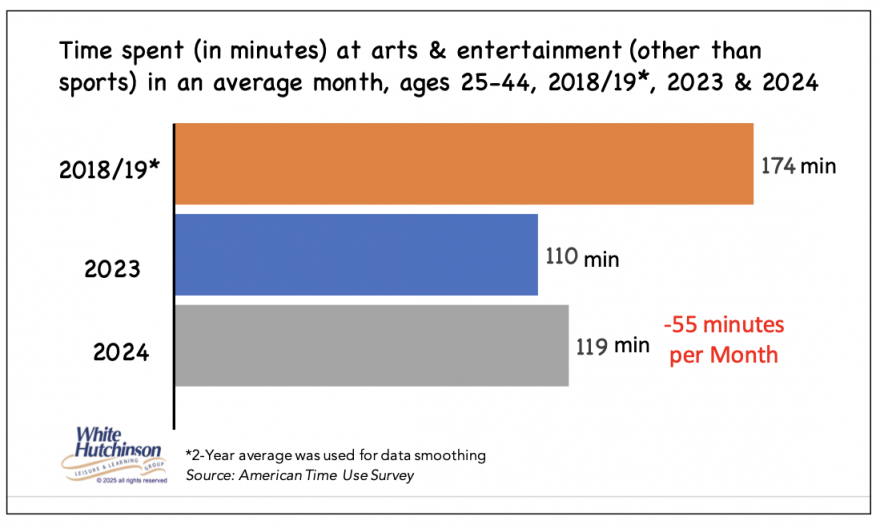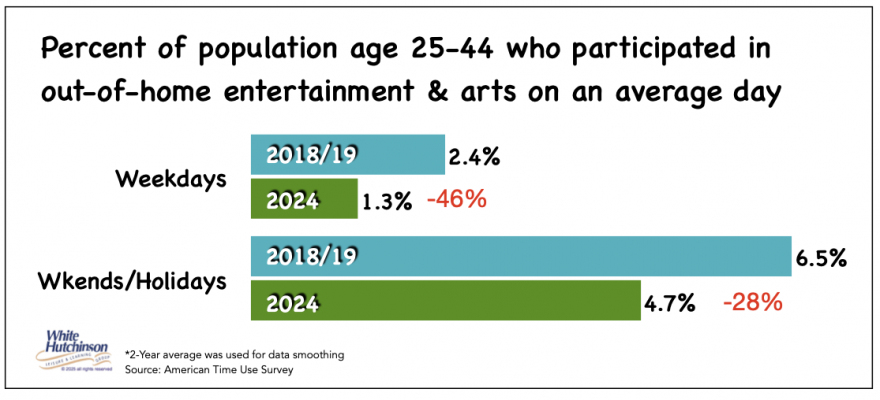
Vol. III, No. 8, August 2025
The new meaning of value
There has been a significant shift in the amount of time people now spend attending entertainment and art venues, which includes agritourism. For adults aged 25-44, the primary family target market, the average time spent is now about 2 hours a month, down from 3 hours pre-Covid, representing a one-third reduction.

Most of the decline in attendance time is due to a decrease in the frequency of attendance. Ages 25-44 attended entertainment and art venues over one-third less often in 2024 (-36%) than they did in 2019. The most significant decline occurred on weekdays, with a frequency reduction of almost half (-46%). On weekends and holidays, overall attendance declined by slightly more than one-quarter (-28%).

Gaining some of that more limited time and attendance is more challenging than it was just five years ago. Venues need to increase their perceived value to retain a sustainable share of the reduced out-of-home entertainment attendance and time.
Consumer perceptions of value have undergone a profound transformation. Today, consumers are more focused on a new meaning of value. For U.S. consumers, value for out-of-home entertainment is no longer synonymous with the cheapest option. Value to consumers in 2025 means getting the most for their money, not necessarily paying less. Most patrons are willing to pay more when they believe the experience delivers superior benefits that endure beyond the event itself. In fact, with many consumers having limited time to visit out-of-home entertainment, they'd rather go for a high-quality, more expensive experience to make the most valuable use of that limited time, to make sure it is time well spent
Today, consumers calculate the value of out-of-home entertainment based on multiple factors, including price, quality, uniqueness, convenience, and personal meaning. While higher prices due to inflation are real, many consumers are willing to pay more when the experience delivers superior benefits, such as social and sharable moments, social currency, and creates memories that last beyond the event itself.
Offering the same value proposition as in 2019 puts an agritourism destination at a competitive disadvantage. What is known as eatertainment - entertainment combined with food and beverage - has gained value-driven popularity in recent years, as it offers consumers more value for their money compared to stand-alone dining or entertainment venues. Many categories of agritourism fit the eatertainment category. However, today, the bar for food has become much higher in order to stay competitive. Agritourism venues need to treat food and beverage as an integral component of the overall experience, rather than merely as a basic concession service. This requires taking some food and beverage selections beyond the traditional cider or pumpkin donuts, kettle corn, and common foods such as hamburgers and pizza to appeal to food adventurers (see The food adventurer formula for agritourism success).
Offering transformational experiences also raises the perceived value of the visit to an agritourism venue. Transformational experiences make you a more knowledgeable and better person, help you grow, and permanently change you in positive ways. They raise the value of a visit to "time well spent."
For apples, an example would be an apple pie cooking class. The attendees might even first pick the apples they're going to use. In a farm market, apple tastings where staff explain the heritage and differences of the apples are another example of a transformational experience. It will provide customers with new knowledge of apples, increase the perceived value of the apples for sale, and introduce customers to purchasing new varieties.
Other examples of transformational experiences include farmer-led farm tours, tours of a farm's cidery, and beer and cheese tastings from local producers. Having a hay wagon ride guide explain the farm's history and what people see on the ride can elevate that experience to a transformational level.
Providing your guests with the meaningful and lasting impact of a transformative experience can give your agritourism venue a competitive advantage and allow you to charge a premium for the experience while offering guests entertainment experiences perceived as good value for their money.
Don't hesitate to look for ways to add transformational value to your customers' visits to remain competitive in today's value-driven out-of-home experience culture.
For more about transformational experiences, see: The magic of added-value transformational experiences.
Subscribe to Agritourism Today



